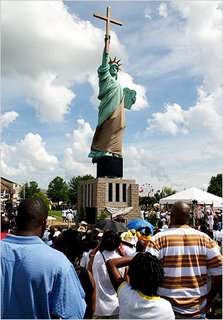The following is long--some might say boring--but indulge me. Among my key complaints with our current leadership--episcopal and lay alike--is the constant tone of conflict, of condemnation, which is sometimes downright hysterical. But there is another way, from the man who would have gotten my vote for pope (if the merely baptized got a say anyway). Cardinal Walter Kasper, the Vatican's chief ecumenical and interreligious officer, offered the following reflections at the recent religious summit in Moscow:
"We are concerned about the problem of peace. We are threatened by ethnic, cultural, national and unfortunately also religious tensions and conflicts; we are confronted with the problem of international terrorism, which misuses religious ideas for perverse ideological purposes, kills innocent people indiscriminately, and spreads fear and horror among the population.
"We are concerned about the problem of justice in our world, where more than two thirds of the world's population live in inhuman conditions of poverty and misery, whereas others live in prosperity and affluence. In addition, there are situations of exploitation, of discrimination and of oppression of human freedom and of fundamental human rights.
"We are concerned about the situation of secularism, especially in the Western world, which deprives human values, both personal and social, of their ultimate religious foundation orientation. As a consequence they are marginalized and made relative to the point that relativism and tolerance themselves become intolerant and oppressive. We lament especially the decline of family values."
Take note: No condemnation, just a measured, thoughtful, and compelling presentation.
And the solution, as Kasper offers it:
"What is the contribution that we as Christians and we as the Catholic Church have to offer? ... First: Respect for the human person, and I add, respect for each human person. Christians are convinced that God created the human being, male and female, in his image and likeness so that each human being, regardless of his or her ethnic, cultural, religious or national belonging is of immeasurable value and merits unconditional respect from other human beings.
"Each individual has the fundamental right to live in a dignified way according to his or her culture and conviction. Such respect for each human person is the foundation for justice, as justice is the foundation for peace. There cannot be peace without justice grounded on mutual respect.
"At the heart of the human person's very nature there stands one's religious conscience. Consequent to this is the moral obligation to follow one's religious calling and seek the truth, and therefore also the need to have free will in religious matters, including the possibility of changing one's religion or even professing oneself atheist...
"But there cannot be human rights for the individual alone, without responsibility for others and for the common good. There is no freedom without personal and social responsibility; freedom of the individual person is possible only within the context of solidarity towards all...
"This brings me to the second point: mutual respect among religions. As has already often been said, there cannot be peace in the world without peace among religions. Obviously, religions are not the same as each other; on the contrary, there are indubitable fundamental differences between them.
"Nevertheless, there is one thing they have in common, which is lacking in a merely secularized conception of the world and of human life: religions inspire openness to transcendence and many believe in a divine reality as the foundation and destiny of all reality; therefore they call for respect for what is holy and stand in opposition to today's widespread attitude of cynicism and disrespect towards nature and human beings. Where respect for the transcendent is lost, respect for the human person is in danger as well....
"As we respect other religions, we must categorically reject the exploitation, abuse and misuse of religion, especially when it is used as a pretext for hate, oppression and terrorism. God is a name of peace and cannot be used as an argument for killing innocent people. As Pope John Paul II in the Message for the World Day of Peace 2002 said: "Terrorism exploits not just people, it exploits God: it ends by making him an idol to be used for one's own purposes."...
"The only alternative to the often quoted danger of a "clash of civilizations" is dialogue between civilizations and religions. Today we live in a world where religions no longer live isolated from one another; in the ongoing process of so-called globalization people of different religions are drawing more closely together and often they live side by side.
"Thus, religions are called not only to tolerate and respect each other, which is in itself no small thing, but they must go a step further: religions have to continue to dialogue and cooperate with each other for the restoration of moral and social values, for justice and peace in the world.
Dialogue does not at all mean syncretism, i.e. a mixture or confusion of religions or an agreement on the lowest common denominator. Dialogue builds on truth and on respect for truth, as Pope Benedict XVI often emphasizes (cf. e.g. World Day of Peace 2006). Dialogue means to share common values and to transmit them to a world which so urgently needs them....
"I would like to close with a point, which seems fundamental to me: As a child I grew up during the horrors of the Second World War. From this traumatic experience I urge you to tell everyone who bears responsibility that war can never be a means to solve problems; war always creates new problems; war is an evil and, insofar as it is up to us, we should do all that is in our power to avoid it and to ban it from the face of the earth.
"Let us tell the world: We as religious people stand for peace: Peace of the heart, peace in our nations and between nations, peace between religions and hence peace in the world."
How might the world respond to Catholicism differently if the pope took such a tone: gentle, compelling, hopeful, rather than condemnatory, hyperbolic, and fearful. Wouldn't we all rather be in such a church?







